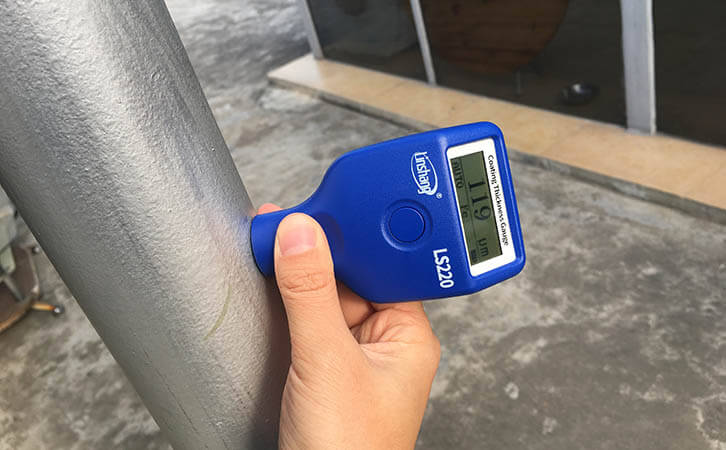Coating Thickness Meter | What is Anticorrosive Paint?
1. What is anticorrosive coating?
Conventional anticorrosive coating can be considered as a coating product that can prevent or slow down the corrosion of metals and other materials under normal circumstances. Its role is to prolong the service life of metal. Industrial anticorrosive coatings is a term for heavy-duty anticorrosive coatings. It is aimed at conventional coatings. It can be applied in relatively harsh environments. It can be protected in harsh environments for longer than conventional coating products.
In addition, we also have a kind of classification of coating products: special coatings, such as high temperature resistant anticorrosive coatings, antistatic coatings. High temperature resistant anticorrosive coating products can withstand high temperature and protect. Generally, high-temperature resistant anticorrosive coatings can withstand high temperatures of several hundred degrees. While professional coatings with special treatments can withstand high temperatures of thousands of degrees and continue to work. There are also antistatic coatings. In addition to the general chemical corrosion protection of the coating object, this coating product can also discharge the static electricity accumulated in the product in a short time, thereby protecting the coating object from being damaged by static electricity.
2. Anticorrosive coating thickness
The coating thickness is an important indicator of whether the anticorrosive coating works. Coating thickness measured by anti-corrosion coating thickness meter is one of the most important quality inspection indicators. For anti-corrosion coatings, anti-corrosion coating thickness meter is almost an essential instrument for coating thickness measurement. The coating has been applied in various industries and it is easy to detect. It has developed into many types such as magnetic induction, ultrasonic, eddy current and simple measurement. Ferromagnetic metals are very different from non-ferromagnetic metals. Therefore, special coating thickness meters are used when measuring the anticorrosive coating thickness on ferromagnetic metal substrates. But some anticorrosive coating thickness meters are currently available. Simultaneous measurement of two types of metal substrates, such as anti-corrosion coating thickness meter LS220H. It is a dual use coating thickness meter that has been well received in the coating industry.
3. Which products can the coating thickness meter be used for?
Magnetic induction thickness measurement principle can be used to measure the non-magnetic coating thickness on the magnetically permeable substrate. Generally, the relative permeability of the substrate is required to be above 500 microns. If the coating material is also magnetic, the difference from the permeability of the substrate must be sufficiently large. At present, magnetic coating thickness meters are often used for coating thickness detection of various products such as car paint thickness, iron-based surface rubber thickness and enamel thickness.
The magnetic induction coating thickness meter LS220H uses a probe with a coil around a soft core to be placed on the detected object. The coating thickness meter automatically outputs a test current or test signal. Early products used a pointer meter to measure the magnitude of the induced electromotive force. The instrument amplifies the signal and indicates anti-corrosion coating thickness. New instruments introduce new technologies such as frequency stabilization, phase-locking and temperature compensation. The upgraded coating thickness meter use magnetoresistance to modulate measurement signals, use integrated circuits and introduce microprocessors, which greatly improves measurement accuracy and repeatability.
The resolution of modern magnetic coating thickness meter can reach 0.1μm, the allowable error can reach 1% and the range can reach 10mm. The magnetic induction coating thickness meter can be used to accurately measure the paint layer, porcelain, enamel protective layer, plastic, rubber coating, various non-ferrous metal coatings including nickel chromium and various anticorrosive coatings in petrochemical industry.
- High precision coating thickness gauge for used car
- Automotive paint protection films coating thickness gauge
- Plating Thickness Measuring Instrument for Detecting Anti-corrosion Coating
- Linshang LS220, LS191, LS160A– Necessary for Car Cover Inspection
- Coating Thickness Gauge for Second Hand Vehicle
- Zero Adjustment Step of Coating Thickness Gauge
